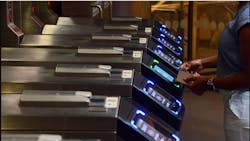MTA announces creation of blue-ribbon panel to combat fare evasion
A blue-ribbon panel was created by the Metropolitan Transportation Authority (MTA that will develop fresh approaches to reducing fare evasion across the entire MTA system of subways, buses, commuter rails, bridges and tunnels.
Members of the “Fareness” panel will focus on innovative approaches to encourage fare payment through education, equity and enforcement. The panel will also look at how technological, design and personnel solutions can help limit fare evasion.
Farebox and toll revenue account for 50 percent of the MTA’s operating budget. In recent years, fare evasion has nearly tripled on the subway from about three percent to more than 12 percent. On buses, approximately 1 out of every 3 bus riders evades the fare. Fare evasion on bridge and tunnel crossings has also become an issue with an increase in fake and obscured license plates designed to evade tolling cameras.
“Our New York sense of fairness and community is violated when rule-abiding, honest folks – people who tap or swipe because they know it’s the right thing to do, even if it’s a stretch economically – see others dodging the fare,” said MTA Chair and CEO Janno Lieber. “What hardworking, fare paying New Yorkers tell us, in a word, is that seeing fare evasion makes them feel like suckers. Fare evasion is a problem we need to solve together. That’s why I am convening a panel of distinguished New Yorkers to take a deep dive into the issue. The goal is to hit the reset button on how we approach fare evasion at the MTA and across government.”
The panel will review approaches that can combat fare evasion with a focus on three key areas: education, equity and enforcement.
Education
To better spread the word that paying the fare is the right thing to do, the panel will look at creative ways to communicate that message to customers of all ages. Communication across all platforms will be discussed to address fare evasion, which has become an increasing problem among a diverse array of customers across the socioeconomic spectrum.
Equity
The panel will explore how the MTA can work with city partners to expand access to the MTA system for low-income New Yorkers so that no one is denied connections to jobs and educational opportunities due to an inability to pay. One approach will be to take a fresh look at the city’s Fair Fares program, which provides MetroCards discounted at 50 percent of the regular fare to New Yorkers living below the poverty line.
Only 200,000 of the 800,000 New Yorkers who qualify for Fair Fares take advantage of the program. Working with the city, the MTA will push for more New Yorkers to enroll in Fair Fares by making it more inclusive and easier to access.
Enforcement
MTA says a law enforcement presence in the transit system keeps customers safe and deters fare evasion. Critics of past approaches to fare evasion enforcement have raised serious questions about equity and racial justice. The panel will look at those questions and recommend fresh solutions that respond to them – considering, for example, greater use of civil penalties; possible increased reliance on civilian MTA staff to do fare compliance checks; and reserving criminal law enforcement for the most serious cases of recidivism or of evasion linked to violent crime.
The panel’s efforts will include partnering with the five district attorney offices to seek a uniform five-borough approach to what will and won’t be charged and under what circumstances.
Panelists include:
- David Banks, Chancellor, NYC Department of Education
- Matthew Fishbein, Former Executive Assistant District Attorney, Kings County; former partner, Debevoise & Plimpton; former Chief of Criminal Division, U.S. Attorney’s Office, Southern District of New York and former First Assistant U.S. Attorney, Eastern District of New York
- Michael Hardy, Executive Vice President and General Counsel, National Action Network
- David Jones, President and CEO, Community Service Society; MTA Board Member
- Roger Maldonado, Partner, Smith Gambrell LLP; former president, New York City Bar Association
- Melva Miller, CEO, Association for a Better New York
- Rosemonde Pierre-Louis, COO, McSilver Institute for Poverty Policy & Research, NYU
- Kate Slevin, Executive Vice President, Regional Plan Association
- Michael Sonberg, Retired Judge, New York City Criminal Court and Retired Acting Justice, New York Supreme Court; former President, International Association of LGBTQ Judges
- Natalia Quintero, Senior VP of Innovation, Partnership for the City of New York and Founding Director of Transit Innovation Lab
- Zachary Tumin, Adjunct Professor of International and Public Affairs, Columbia University; former NYPD Deputy Commissioner for Strategic Initiatives
- Jo-Ann Yoo, Executive Director, Asian American Federation
Additional members of the panel may be added at a later date.
